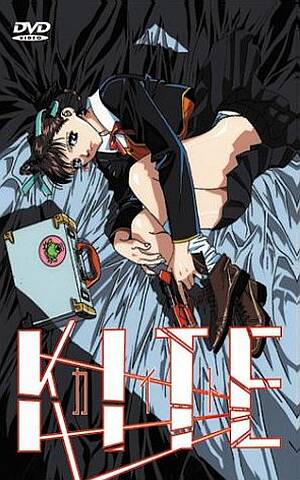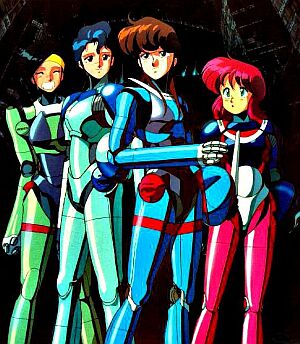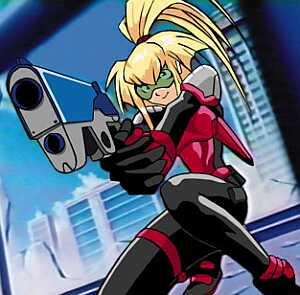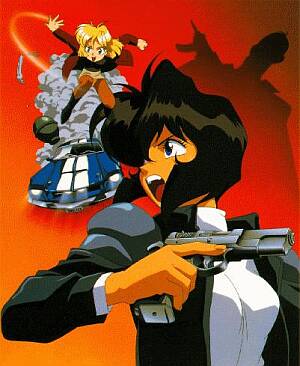★★★½
“Raises some interesting questions regarding the Japanese educational system.”
 Project A-ko is one of those odd films that probably could only be done as anime, though as live-action goes, something like Kung Fu Hustle comes close. It centers on three schoolgirls, A-ko, B-ko and C-ko: the first two are rivals for the third’s attention…but despite the lesbian subtext, it’s really not that kind of story. [Though the film was originally intended to be part of the Cream Lemon series, which definitely are those kind of stories] No, it’s far more concerned with A-ko’s superpowers, to which she’s largely oblivious, the gadgetry cooked up by B-ko, thanks to her apparently limitless finances, and C-ko’s ancestry, which turns out to be not of this Earth – and that explains a lot, it has to be said.
Project A-ko is one of those odd films that probably could only be done as anime, though as live-action goes, something like Kung Fu Hustle comes close. It centers on three schoolgirls, A-ko, B-ko and C-ko: the first two are rivals for the third’s attention…but despite the lesbian subtext, it’s really not that kind of story. [Though the film was originally intended to be part of the Cream Lemon series, which definitely are those kind of stories] No, it’s far more concerned with A-ko’s superpowers, to which she’s largely oblivious, the gadgetry cooked up by B-ko, thanks to her apparently limitless finances, and C-ko’s ancestry, which turns out to be not of this Earth – and that explains a lot, it has to be said.
This is as much parody as anything else, and what you get from it will, to some extend, depend on what you bring; for example, knowing that Mari, part of B-ko’s gang, is a pig-tailed dead-ringer for Ken from Fist of the North Star, with a squeaky voice. The rest is tongue-in-cheek SF, that revels in excess, particularly in the second-half. This is markedly less successful than the simple love-triangle, culminating in a marvellously destructive brawl between A-ko and B-ko, that starts off in school, then moves into the nearby city, where the pair end up facing an alien invasion. In the words of Monty Python, it’s just “too silly”, toppling over into ludicrous explosions for far too long, that proves rather less entertaining than the more understated irony from before.
The voice-acting (at least in the Japanese version; as usual, I couldn’t bring myself to listen to the dub) is solid; B-ko is one of the most tremendously irritating characters you can imagine, but that’s entirely deliberate. Of particular note is the soundtrack, largely by American session musicians, Richie Zito and Joey Carbone, which thereby avoids the usual J-Pop cliches. Okay, largely by replacing them with American cliches, but the result is still pretty cool, in a Giorgio Moroder kinda way; hey, it was made in 1986. The result is solid, if entirely brainless, fun – and how can you not like a film which borrows its title from one of Jackie Chan’s best?
Dir: Katsuhiko Nishijima
Stars (voice): Miki Itoh, Michie Tomizawa, Emi Shinohara, Tessho Genada





 Concerns about some content here means Kite has had a tortuous release in the West. First time out, in 1998, it was shorn basically of all explicit sexual content: given the potentially underage nature of the animated heroine, Media Blasters didn’t want to be hit with a kiddie porn charge – laughable though that may seem for a “cartoon”! – and played it very safe. Subsequent releases over the next six years restored first much, in the “Director’s Cut”, then all (“Special Edition”) the footage, but the OAV* might just work better without the sex. It’s hardly as if I finished it and thought, “Y’know, what this really needs is some sequences of the heroine getting
Concerns about some content here means Kite has had a tortuous release in the West. First time out, in 1998, it was shorn basically of all explicit sexual content: given the potentially underage nature of the animated heroine, Media Blasters didn’t want to be hit with a kiddie porn charge – laughable though that may seem for a “cartoon”! – and played it very safe. Subsequent releases over the next six years restored first much, in the “Director’s Cut”, then all (“Special Edition”) the footage, but the OAV* might just work better without the sex. It’s hardly as if I finished it and thought, “Y’know, what this really needs is some sequences of the heroine getting  It’d probably be best to watch the original film, Poly Matrix, immediately before this, as otherwise, you’ll be kinda hitting the ground running. After those events, Ross Syllabus and “Third” [a model of android which can reproduce] Armitage have set up home with their daughter, who doesn’t know her mother is anything by human; meanwhile Ross operates under an assumed name as a security guard. However, an incident turns him into an unwilling spokesman for robot rights once again, and when he is sent to Earth as a Martian delegate, his daughter Yoko is kidnapped by a faction seeking to reverse his vote. It’s time for Armitage to put aside her chores and kick butt.
It’d probably be best to watch the original film, Poly Matrix, immediately before this, as otherwise, you’ll be kinda hitting the ground running. After those events, Ross Syllabus and “Third” [a model of android which can reproduce] Armitage have set up home with their daughter, who doesn’t know her mother is anything by human; meanwhile Ross operates under an assumed name as a security guard. However, an incident turns him into an unwilling spokesman for robot rights once again, and when he is sent to Earth as a Martian delegate, his daughter Yoko is kidnapped by a faction seeking to reverse his vote. It’s time for Armitage to put aside her chores and kick butt. As a rule, we don’t watch dubbed anime, finding it a painful experience; unfortunately, this version, which compacts four OAVs into a feature, is
As a rule, we don’t watch dubbed anime, finding it a painful experience; unfortunately, this version, which compacts four OAVs into a feature, is  Don’t believe the running time: listed at 83 minutes on the DVD sleeve, this is actually under 50, a nasty piece of marketing to make you think you’re getting a full-length movie. Not sure whether an extra 25 minutes would help or harm here: there is certainly room for development, but equally, there is an awful lot of slack which seems designed only to show off whizzy digital animation. Saya is a vampire. She’s also a killer, tasked by…well, it’s never quite made clear
Don’t believe the running time: listed at 83 minutes on the DVD sleeve, this is actually under 50, a nasty piece of marketing to make you think you’re getting a full-length movie. Not sure whether an extra 25 minutes would help or harm here: there is certainly room for development, but equally, there is an awful lot of slack which seems designed only to show off whizzy digital animation. Saya is a vampire. She’s also a killer, tasked by…well, it’s never quite made clear  Worthy of note as one of the first pieces of anime made available to an English-speaking audience, (not long after its original 1985 Japanese release), BGC is set in 2032, when Tokyo has been rebuilt, post-earthquake. The Genom corporation are fiddling with Boomers, biomechanical robots of immense strength but with a nasty tendency to run amok. Standing guard are a mysterious team, the Knight Sabers, with their own technological strengths, who alternate between merc work and more altruistic concerns.
Worthy of note as one of the first pieces of anime made available to an English-speaking audience, (not long after its original 1985 Japanese release), BGC is set in 2032, when Tokyo has been rebuilt, post-earthquake. The Genom corporation are fiddling with Boomers, biomechanical robots of immense strength but with a nasty tendency to run amok. Standing guard are a mysterious team, the Knight Sabers, with their own technological strengths, who alternate between merc work and more altruistic concerns. This teeters infuriatingly close to greatness, but eventually succumbs to mediocrity because of a tendency to juvenile smuttiness, that fatally weakens what is, at heart, an intriguing story and setting. The Warriors are a special police group – mostly female, with one token (lecherous) man – sent in to sort out nasty cases. The main thread in the four episodes here, is a virtual drug which can turn the consumer into a mind-controlled killer – or, presumably, anything else desired.
This teeters infuriatingly close to greatness, but eventually succumbs to mediocrity because of a tendency to juvenile smuttiness, that fatally weakens what is, at heart, an intriguing story and setting. The Warriors are a special police group – mostly female, with one token (lecherous) man – sent in to sort out nasty cases. The main thread in the four episodes here, is a virtual drug which can turn the consumer into a mind-controlled killer – or, presumably, anything else desired. Four stars but no seal of approval? That’s because this is about the most wildly variable animated film I’ve seen. The story and characters are great, but the frequent sex scenes are incredibly tedious and clearly put in solely for the teenage male fan (all pneumatic breasts and moaning). It’s rare for me to say this, but they are genuinely gratuitous, and the film could have coped fine without them.
Four stars but no seal of approval? That’s because this is about the most wildly variable animated film I’ve seen. The story and characters are great, but the frequent sex scenes are incredibly tedious and clearly put in solely for the teenage male fan (all pneumatic breasts and moaning). It’s rare for me to say this, but they are genuinely gratuitous, and the film could have coped fine without them.
 Watching this dubbed was, for once, viable since despite its Japanese origins, it’s firmly set in and around Chicago. So we did sit through some of it in English, but the accents were woefully Cal-girl and thus we’d recommend sticking with the Japanese, even more unlikely though it might be. That out of the way, this is an action-packed romp, in three episodes but effectively one story. Rally Vincent and May Hopkins, one a crack marksman, the other an explosives expert, own a gun store, but are blackmailed by the ATF into helping nail an arms ring. It’s not as simple as it seems, since the perps have connections at a high level, and the services of a former Soviet Special Forces hitwoman.
Watching this dubbed was, for once, viable since despite its Japanese origins, it’s firmly set in and around Chicago. So we did sit through some of it in English, but the accents were woefully Cal-girl and thus we’d recommend sticking with the Japanese, even more unlikely though it might be. That out of the way, this is an action-packed romp, in three episodes but effectively one story. Rally Vincent and May Hopkins, one a crack marksman, the other an explosives expert, own a gun store, but are blackmailed by the ATF into helping nail an arms ring. It’s not as simple as it seems, since the perps have connections at a high level, and the services of a former Soviet Special Forces hitwoman.